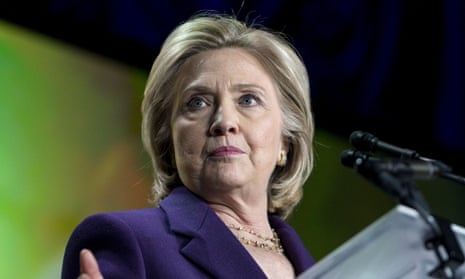Secretary of State Hillary Clinton did not use a government email account during her time in the administration. She didn’t have to, but she should have! The first part of that sentence should be the end of any potential scandal discussion; the second part should be the beginning of our discussion of how we feel about public records. But since we live in a far more useless world, we’re going to wind up doing this backwards.
It’s all happening again. It’s going to happen forever. The Clintons might have taken another shortcut and may be hoping their fans will bail them out; the Republican Party has furnished another disingenuous bit of likely non-scandal to a press corps that knows “Unethical Clintons!” stories draw a lot of eyeballs. People will, again, define a government ethics issue through the lens of fan advocacy.
Usually, Slate’s reflexively contrarian default stance isn’t useful, but in a world in which everyone is running after the Clintons and making ominous “boogieboogieboogie” noises, Josh Vorhees is helpful: no one can point to a specific law Clinton violated. The Obama administration’s public records law mandating a public email account was passed after the end of her Secretary of State tenure; the National Archives and Records Administration’s 2013 bulletin stating that “agency employees should not generally use personal email accounts to conduct official agency business” reads more like a suggestion and, again, post-dates Clinton’s time at State. The 2009 NARA guidelines that Politico’s Dylan Byers cites in his reporting may have been binding, but it also may have been satisfied by Clinton’s voluntarily handing in over 55,000 pages of private emails. And Michael Tomasky notes at the Daily Beast that the New York Times – which got a lot of mileage out of Whitewater – went to press with a piece heavy on emphasis and thin on concrete details for something that’s supposed to be a clear-cut ethics violation.
What’s left are 55,000 pages of seeming compliance with the letter of the law, the unknown standards by which her aides determined that and the apparent fact that Clinton set up her private email on the day of her Senate confirmation hearings. We have no idea if Clinton used her private email address cynically to circumvent mandated disclosures. For instance, according to Gawker (which originally discovered the existence of the email account) Clinton used it to consult with former Clinton Administration aide Sidney Blumenthal on the subject of Benghazi. That could mean something as sinister as plotting official government strategy, or as anodyne as a friend commenting on another friend’s public appearance. Uncertainty creates more problems than disclosure.
So now her private email account is a political football. Trey Gowdy (R-SC), the chairman of the House select committee to investigate the 2012 Benghazi attack, was reportedly aware of the emails over a month ago. Not to indulge in the sort of paranoia usually proffered by a committee that has spent over two years claiming that Hillary Clinton knowingly killed four Americans and has come up with absolutely nothing even approaching proof of that, but it might seem odd to you that a Republican political stunt committee became aware of a private email cache at roughly the same time that a mainstream Republican heir apparent selectively released a cache of his private emails in an empty political stunt. And, whoa, hey, will you look at that! Jeb Bush tweeted on Monday: “Transparency matters”, with a link to the website where he published his emails. “Unclassified @HillaryClinton emails should be released.”
We could have already been having a smart discussion about emails, transparency and the ethics and impacts of erring on the side of public knowledge. It’s a discussion that can only happen if it’s divorced from the Committee to See Who Killed Ben Ghazi and the “Will Forte Playing An Albino Huckleberry on Weekend Update” character who heads it with all the integrity of a naval fleet made of colanders. We should probably lean towards making all communications from public servants available to their constituents, if for no other reason than to remove the urge to make disclosing them a political gesture.
But we should also ask who gets hurt by such an open records policy, besides elected officials. Jeb Bush’s emails, for instance, illustrated how difficult it is to establish the boundaries between public and private interest. Many of the emails he received were deeply personal – he withheld those pertaining to politics and fundraising, which would be the ones of actual public interest – with citizens using subjects of public interest as a pretext for addressing their anxieties, expressing their frustrations or just asking someone to listen. Bush’s release doxxed thousands of Floridians so he could grandstand about transparency vis-à-vis emails that news organizations could already have obtained via public records searches.
Even if his execution was abysmal and his intent baldly political, Bush came down mostly on the right side of the issue, as underscored by recent events in his Florida. In 2013, the overwhelmingly Republican state legislature passed a blind trust law allowing officials like Governor Rick Scott to hide their investments from voters; meanwhile, despite running on a platform of transparency and despite setting up “Project Sunburst” to give media and citizens access to staff emails, Scott repeatedly circumvented public records. His staff used private emails and private phones to set up meetings with lobbyists, then sued to prevent the disclosure of those records. That Florida citizens are even aware of them is owed to the efforts of one tireless Tallahassee lawyer who’s willing to file records requests for anything he can think of and sue for their release. And that’s in a state with a sunshine law.
In the absence of full disclosure – and, what with the Trey Gowdy’s of the world, long after we get that disclosure – the American public will instead be treated to Washington and its commentariat breaking into teams and assigning malice or innocuousness to the ambiguity as it suits them. Republicans will see a through-line of malfeasance from Whitewater to Benghazi, while Democrats will see a continuation of two decades of politically-motivated, demonizing investigations. When Karl Rove used RNC emails to conduct business, it was part of more cronyist conspiracy, but Hillary Clinton is merely a tech unsavvy lady who cut some corners the way we all do. This is either more proof that the Clintons don’t obey the rules because they are evil, or proof that the Clintons bend the rules because they are infuriatingly lazy. Whatever policies exist will be insufficient, and best practices never established.
If we’re lucky, we’ll end up with a stalemate like the one over wiretapping and undeclared war: we’ll all accidentally rubber-stamp their permanent use by excusing politicians we support, while endlessly screaming that it’s evil when the other guy does it. As with each new Clinton scandal, it feels like going back to high school: trapped in an endless immature cycle way too many people are happy to never escape where the popular kids coast on charm, doing the full amount of work seems deprecated, bullies still have power, gossip rules all, and no one will ever ever learn.

